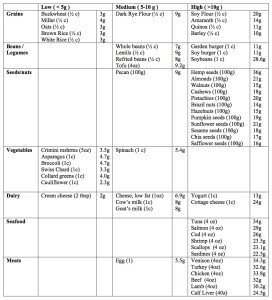
Your body’s need for protein increases significantly during pregnancy – to support growth of maternal tissues (breast and uterus) as well as fetal growth and brain development. Low protein intake during pregnancy is associated with increased risk of “small-for-gestational age” babies, and animal studies also indicate a link between low protein intake and increased risk of hypertension.
So how much protein should a pregnant woman consume? And in what form?
The research tells us that protein needs increase in each trimester of pregnancy. Start by determining your typical protein RDA (while this is up for debate, recommended protein intake is generally considered to be about 0.8grams of protein per kilogram – which would mean about 60 grams of protein per day for a 165lb woman, or 20 grams per meal). Then add these amounts to your RDA:
- 1 g/day in the first trimester of pregnancy (barely significant)
- 8 g/day in the second trimester (easily met with an extra high-protein snack)
- 26 g/day in the third trimester (now some meal planning is required!)
- 21g/day during exclusive breastfeeding (and 14g/day for ongoing breastfeeding)
There are countless delicious options to gather those extra grams of protein, including vegetarian options like nuts and seeds (hemp and chia are great choices with healthy fats in them as well), beans/legumes (providing needed fiber as well), protein powders in your smoothies (I like soy-free plant-based protein powders best), as well as organic meats/eggs/dairy and low-toxin fish (sole, haddock and halibut are good choices).
Here is a great table to help you add up your proteins to see if you are getting enough!
If you are hungry for more evidence-based information in your pregnancy, sign up for my free webinar: 7 Pregnancy Myths Debunked – and get the information you need to have a healthy pregnancy and a thriving baby.
And if you are a care-provider looking for evidence-based resources for your pregnant patients, please get in touch with us at support@myhealthypregnancyplan.com.
In health,
Dr Jocelyn Land-Murphy, ND
Terra Life
Disclaimer: The information and content provided is for general educational and informational purposes only and is not professional medical advice, nor is it intended to be a substitute therefore. Please consult the Disclaimer and Terms of Use for full details.
References:
Kramer, M.S. & Karuma, R. (2003). Energy and protein intake in pregnancy. Cochrane Database Systematic Review, 2003(4).
Langley-Evans, SC. (2000). Critical differences between two low protein diet protocols in the programming of hypertension in the rat. International Journal of Food Science Nutrition, 51(1): 11-7.
Marangoni, F. et al. (2016). Maternal diet and nutrient requirements in pregnancy and breastfeeding: an Italian consensus document. Nutrients, 8(10): 629.
Ota, E. et al. (2015). Antenatal dietary education and supplementation to increase energy and protein intake. Cochrane Database of Systematic Reviews, 2015.







Thanks for sharing this post. Mothers really need to be selective on choosing what to eat. They need to be extra careful for themselves and for their baby.